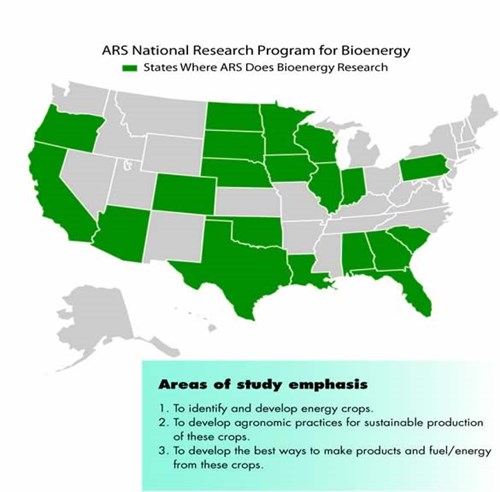ARS National Research Program for Bioenergy
The ARS national program on Bioenergy and Energy Alternatives (#307), described on the Web at www.nps.ars.usda.gov, is expected to reduce the nation’s dependence on foreign oil, improve the environment by developing alternative energy sources, increase use of agricultural crops to produce biofuels, and help create jobs and economic activity in the United States.
Bioenergy research is, without a doubt, one of today’s hottest topics. But ARS has been conducting bioenergy research for more than 50 years, with such successes as helping perfect the cold tolerance of biodiesel, finding that brief exposure of corn to anhydrous ammonia can reduce the costs of producing fuel ethanol from the grain, and validating the benefits of switchgrass as an energy crop.
ARS is uniquely positioned to contribute to developing bioenergy from renewable agricultural resources. The agency’s nationwide network of laboratories has experts in every facet of bioenergy—genetics and genomics, agricultural production, conversion technologies, and value-added coproducts—and this allows integrated and coordinated research efforts that will lead to a large and sustainable bioenergy industry.
ARS researchers are looking at the entire continuum of producing energy from agricultural materials, starting with DNA fingerprinting of plants to study their suitability as bioenergy crops, then improving growing and harvesting procedures, and finally, developing new processes for converting a wide range of agricultural products into high-quality energy, fuel, and valuable coproducts.
Rather than a single-crop bioenergy answer, the agency is identifying crops that are most suitable for biofuel production in various regions of the United States. Developing bioenergy crops that work for different growing regions will provide more opportunities for biofuel production and help make it a nationwide endeavor.
Another major focus for ARS research is developing both biochemical (biocatalytic) and thermochemical methods to convert plant cellulose, hemicellulose, and lignin to bioenergy and coproducts.
Developing value-added coproducts for biorefineries is a unique strength of ARS. And ARS research emphasizes biorefinery technologies that can convert agricultural and food wastes and those that can be deployed at or near the farm.
The bioenergy research program also involves research into important environmental areas, such as reducing greenhouse emissions, increasing carbon sequestration, and sustainable use of crop residues as well as dedicated energy crops.
In addition, ARS continues to conduct research to develop high-value, biobased products from both the raw crop and the leftovers from biofuel production. Such products would help make biorefineries more efficient and economically viable.
ARS is a leader in bioenergy research, with wide-ranging expertise in all aspects of the problem and a coordinated, integrated plan for tackling one of the most important issues facing the country today.

"ARS National Research Program for Bioenergy" was published in the October 2008 issue of Agricultural Research magazine.






